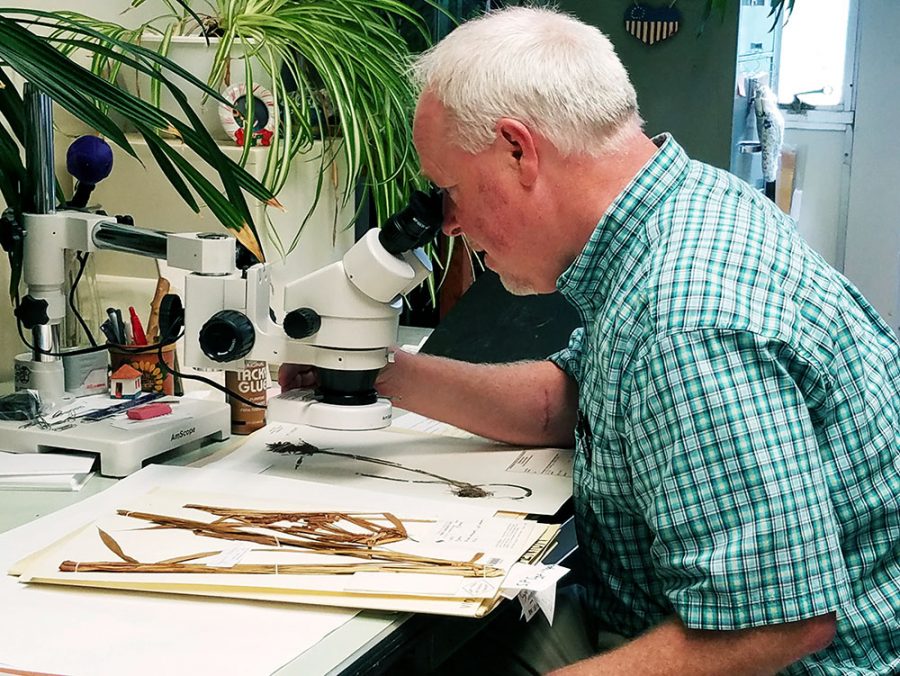Professor is planted with recognition
Angelica Cataldo | The Daily Eastern News Gordon Tucker, a biology professor, examines samples he had on file in his office. Indian botanists named a plant species after Tucker because of his contribution to their work.
September 5, 2016
Not many people can say that a newly discovered species of plant is named after them, but it can be said about botanist and long-time Eastern professor Gordon Tucker.
Fimbristylis tuckeri, a newly discovered species of the sedge family, was found in the Western Ghats, a mountain range on the coast of the Indian Peninsula.
Tucker worked with the botanists in India remotely through email, sending pictures and data of the plant specimens being collected. After receiving help from Tucker, they named the plant after him.
The editor of the Kew Bulletin, an international journal for botany studies, and a friend of Tucker’s were the ones who broke the news to Tucker.
“It really made my day and I was really excited about it,” Tucker said. “I felt honored and flattered at the same time. It was nice to have some recognition.”
Since the 1970s, Tucker has been a professional botanist and has published papers and monographs detailing his study as a vascular plant systematist specializing in sedges.
The sedge family contains more than 5,500 species, closely resembling grasses and rushes and is highly common in both Asia and South America.
Throughout his career, Tucker has worked with other botanists from Korea, India, China and Illinois. He has also traveled around the world to study Botany in places such as China, Brazil, Mexico and Nepal.
He has had the honor of, not only discovering new species of plants, but also naming them. He said he has named plants after professors and other scientists he worked with.
Tucker was not the first Eastern instructor to have a plant species named after him. John Ebinger, a retired professor, had the Elymus ebingeri named after him in 1997.
In 1996, Tucker became a professor in the department of biological sciences and succeeded Ebinger as the curator of the Stover-Ebinger Herbarium.
Open to the uses of undergraduate and graduate student, the herbarium houses 82,000 plants specimens.
Tucker teaches a long range of courses that include plant taxonomy, dendrology and a course studying medicinal plants. His medicinal plants course is a new class for the fall semester.
“One of the interesting thing about medicinal plants is investigating new species and determining if they have medicinal values and usages,” Tucker said.
Since his start in the field, Tucker has led multiple research projects in association with the Missouri Botanical Garden and the Chinese National Academy of Science.
He and Eastern Professor Zhiwei Liu have led and co-taught a study abroad course that studies plant usage and culture in China.
Students who attend the course experience the cultures in the different cities they visit, as well as learning about the native plant species and how they are used in certain regions of China.
Aside from his international studies, Tucker has also worked with studying native Illinois plant species. He is also involved with writing and publishing for academic journals for botany all over the globe.
“I think it’s important that people be aware that we have lots of people here at Eastern that have specialties working with biology and other subject that also have international connections, not just here in Illinois,” Tucker said.
Angelica Cataldo can be reached at 581-2812 or [email protected]




















































